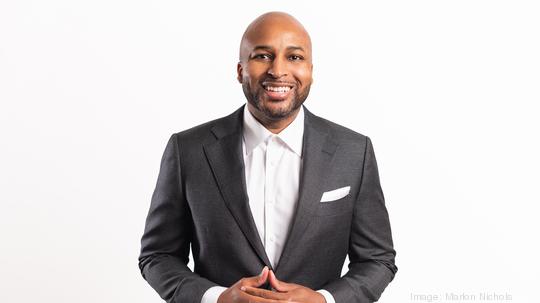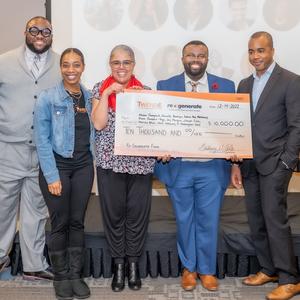
Marlon Nichols made trips from Los Angeles to Nashville in August and September — and he could be around more frequently in the months to come. Nichols is a co-founder and managing general partner of MaC Venture Capital. The majority Black-owned investment firm has raised $313 million since it was founded three years ago. Nashville Inno spoke with Nichols at Launch Tennessee's 3686 Festival for startups and entrepreneurs, where he was a featured speaker.
Inno: When you're evaluating a possible investment, do you have a favorite question that you'll ask?
Nichols: The economic question I always ask is, "How do you get to $100 million in revenue, and how quickly can you get there?" You add a 10x multiplier on that, and you've got a billion-dollar-valued company. I want to understand how many people or entities you have to sell to in order to get to that revenue. And, can you go well beyond that number? I also want to understand what percentage of this market you need to own. Hopefully it's a very tiny piece.
Have those questions changed in the current economic climate? The past two to three years, it's been grow at all costs. Forget about the business fundamentals, just grow — the money will be there. We've never been attracted to those companies. I find myself asking more about burn and runway. You want to raise $3 million, $5 million? I need to know if my money can get you at least 18 months. We need to make sure you have the time to weather this fundraising storm.
Especially since the pandemic began, we've seen an influx of Californians here. Do you feel like it's truly an "exodus" from California? I think it's very real for northern Californians, the San Francisco Bay Area. The thing with San Francisco is, no one's from there. They're all coming from somewhere, and now you have a chance to get back to where your family is. The streets are very quiet in San Francisco. I left years ago, for L.A., because I wanted a better quality of life. I wanted more diversity. I wanted better weather.
There's been a whole lot of chatter about how Silicon Valley isn't the tech epicenter anymore. How much of that is legit? All of the household names, in terms of venture capital, are still operating in Silicon Valley. And I don't think that's going to change. They'll set up offices in other places as well. It's catching on that there are great companies throughout the country. But I don't really see Silicon Valley not being Silicon Valley, in terms of the amount of investment dollars coming out of there.
What's something you know now that you wish you knew earlier in your career? You've got to always take big swings. You can play it safe and go for little base hits because you know you can get them. But if you're looking for big outcomes, you've got to swing big. Have a big vision and really go after that vision — that's going to resonate much more with venture investors than a small vision.
What's the business case for having more diversity in venture capital? Human nature is comfort and familiarity. If you walk into a room, probably the person you're going to talk to is another white guy, roughly the same height, dressed similar. It's comfortable. That is how business works: You're going to do business with you feel comfortable with. If you look at who's holding most of the money, it's primarily white guys. Where they're investing the money is primarily other white guys, because it is familiar. There are phenomenal companies being built by women, by people of color, solving real challenges for big parts of the population. We need more folks who aren't necessarily white guys, writing the checks. The other side is being familiar with the problem. If an investor grew up in an affluent neighborhood, was a member of a country club, etc., and you have a founder building a solution for people growing up in the projects — you can get there, but it might take you longer to connect the dots to say, this really is a massive problem.
What's your advice to a diverse founder, striving to attract some of that money? At the end of the day, it's got to be about returning money to our investors. The more you can build something that is valuable, the better shot you're going to have. It's a game of numbers: You gotta do the reps. You have to figure out how to find these investors and get in front of them. You have to work your network to death. It's effort — but along with that, you have to have substance. You've got to build something compelling and valuable, and you'll at least get the meetings. Then you've got to win them.
This summer, your firm closed its second fund, totaling $203 million. Any of that money coming to Nashville? Hopefully! The hope when you come to these things is that you meet local investors, because they should have their thumb on the pulse. You want to build a relationship with them and get pulled into the deals that are top-notch here.




